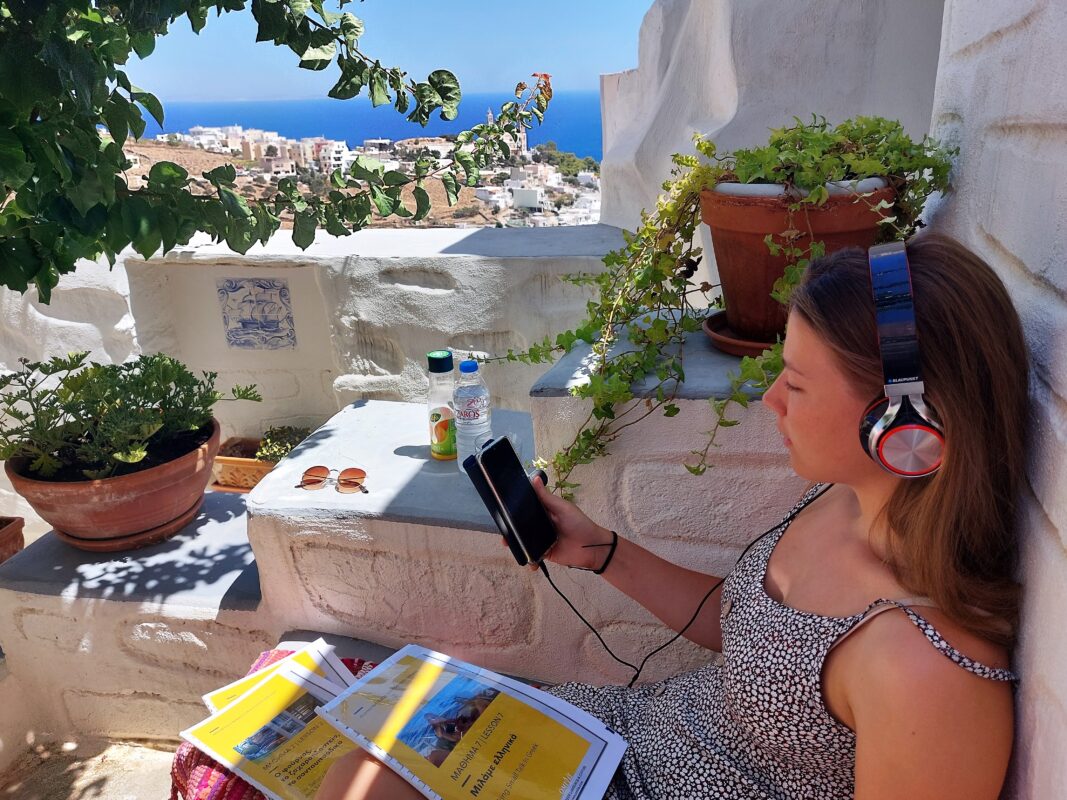Greek Language
Greek For Beginners – Words You Actually Already Know!
“On that hot July morning, the ancient olive tree with its silvery green leaves cast its shadow on the dry ground…”
Just like Plato some 2400 years ago, my niece used the breeze and shade of a tree offered to start learning Greek.
A good atmosphere is half of the work, and on a Greek island, it is easier to learn Greek, than in a classroom elsewhere in the world.
My niece has visited me many times in Greece, and every time expressed her desire to learn Greek. She realized that her holiday in Greece would be so much nicer if she could also communicate with the Greeks.
While enjoying breakfast and stirring with a straw in her cold frappe, she enjoyed the beautiful view of the blue sea and had recuperated enough energy to start learning some Greek words.
For so many years, she was scared to start learning Greek, but after she managed to learn the Greek Alphabet back home, with the easy-to-use multi-media Greek Alphabet eBook, she was now ready to finally start her Greek language adventure.
A loved theme among people who just start learning Greek is looking for Greek words that actually also exist in your own native language. If you can recognize words, they are so much easier to remember!
“Give me any word and I’ll show you that it is of Greek origin”, the Greeks often say. This is perhaps slightly exaggerated, although back to the times I moved to Greece, I was amazed myself how many words are of Greek origin.
So to encourage my niece and prove she knows many Greek words already, I gave her a list of words ending with ‘ologist’.
‘Ology’ comes from the ancient Greek word ‘logos’, which means ‘word’, what we in English prefer to translate into ‘the study of something’. From ‘ology’ the suffix ‘ologist’ is then derived, which indicated the person who is conducting that study. The first part of these words is usually also of Greek origin.
For example gynecologist . ‘Gynaika’ means ‘female/ woman’, so here we are talking about “someone who studies the female body”. Cardiologist; ‘kardia’ means ‘heart,’ indicating a heart specialist.
By the way, for your info, you can call your loved one also ‘kardia mou,’ which literally means ‘my heart’.
*The list goes on: anthropologist comes from the word ‘anthropos’ which means ‘man / human being’.
*You know that a dermatologist is a specialist where you go for skin problems, but maybe you did not know that ‘derma’ in Greek means ‘skin’ or ‘leather’.
*A psychologist is interested in your “psyche “- your soul. Greeks are also masters in using cute names, and this word is affectionately used as: Psychi mou! (my soul)
*And what is a theologist? If you know that ‘theos’ in Greek means ‘god’ or ‘deity’, then you know the answer.
*A geologist knows all about the earth since ‘gea’ was the Greek ‘Goddess of the Earth’.
Of course, there are many other kind of lists as well, like the one with words ending on “phobia”
* ‘Fovos’, which means ‘fear’. So all “phobias” have to do with fear of the word before. Hence I now understood what means ‘agoraphobia’ and ‘arachnophobia’ !
We could still continue for a while, but the time had come for some conversation practice and learning easy sentences!
There are so many things you can learn, related to everyday language, without needing too complicated grammar or too much vocabulary.
My niece slowly slowly (siga-siga) started speaking with simple sentences and lost her fear of speaking Greek.
Every day she practiced in the tavern, in the bakery, with Greek friends visiting us, etc…and her holiday was becoming more and more Greek on a daily basis!
In order to help niece and other friends out, I started creating the Greek Speaking Starter Kit, together with the teachers of the Omilo school.
It proved to be successful, and after finishing all the videos, audios and eBooks, it is now also available online, for anybody to use… anytime, from any place…
Thank you Omilo, for your cooperation. Ευχαριστώ!
If you are also interested in learning the everyday Greek Language, with simple grammar and usefulvocabulary you will need on a daily basis when visiting Greece (including the Greek Alphabet eBook) ,
then click here and take a look
(Good news! With the above link, there is a 50% discount since you are reading this article, and showing an interest in learning Greek 🙂 )
Below the vocabulary mentioned above, in Greek and “greeklish”
If you are not familiar with the Greek alphabet, you can read the “greeklish”, but it is advised to learn the Greek Alphabet when visiting Greece..
Only 24 letters 🙂 Good luck.
Η γυναίκα – i gynaika – the woman
Η καρδιά – i kardia – the heart
Καρδιά μου – kardia mou – sweetheart (literal translation ; my heart)
Ο άνθρωπος– o anthropos – the human/the man
To δέρμα – to derma – the skin
H ψυχή – i psychi – the soul
Ψυχή μου– psychi moe – darling (literal translation; my soul)
O θεός – o theos – god
Ο φόβος– o fovos – the fear
Η φοβία – i fovia – the phobia/fear
Η αγοραφοβία – i agoraphobia – agorophobia (literal translation: fear for open spaces)
H αραχνοφοβία – i arachnophobia – arachnophobia (literal translation: fear of spiders)
H αράχνη– i arachni – the spider
Ευχαριστώ– efcharisto – thank you

